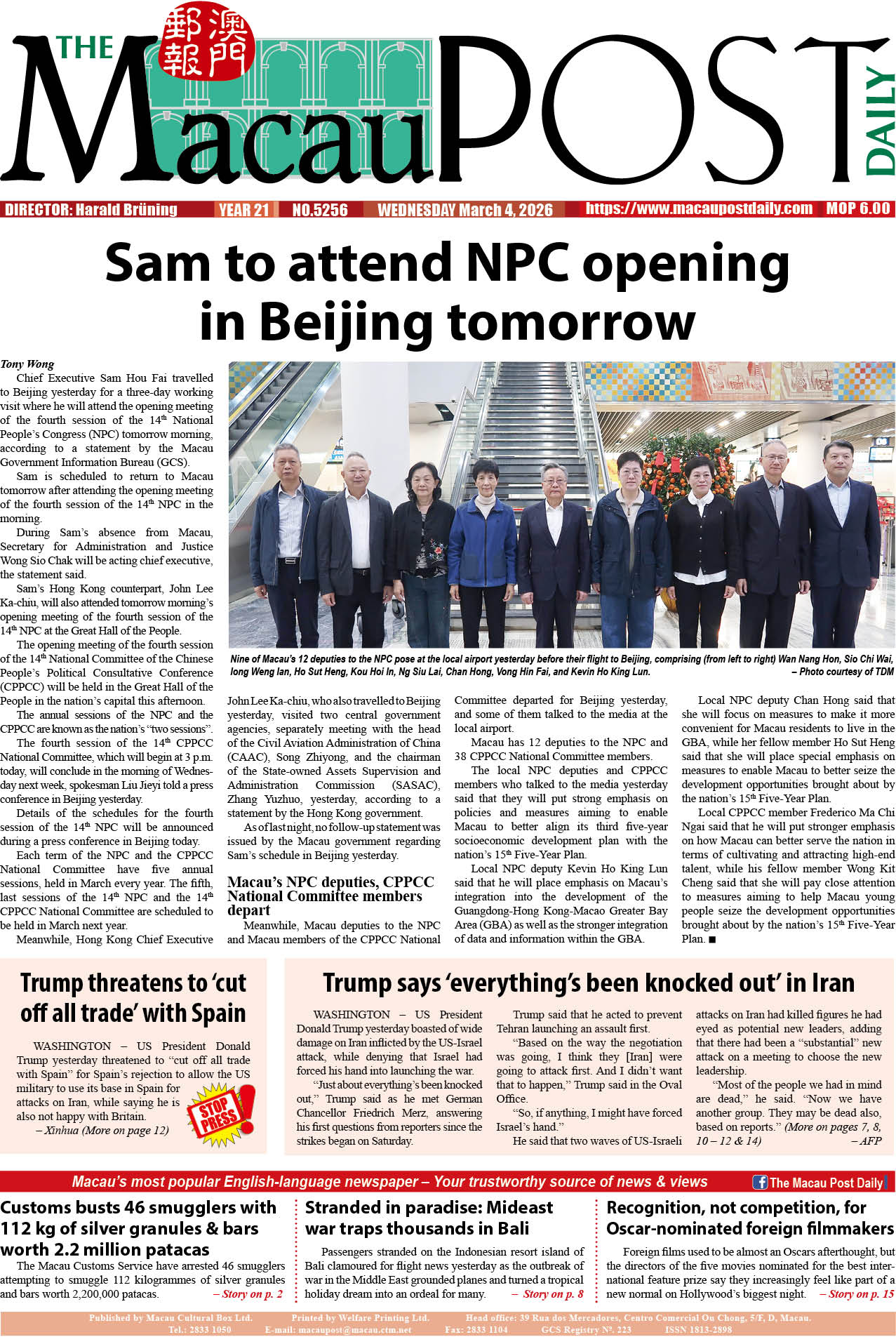I read over the weekend an inspiring article by English writer Geoff Dyer in the prestigious The New Yorker magazine, dated March 16, with the thought-provoking title “The Existential Inconvenience of Coronavirus”. I recommend it to everyone interested in understanding the multifarious – and nefarious – implications of the COVID-19 pandemic.
Of course, the novel coronavirus is an existential inconvenience or, to put it blandly, a pain in the backside. And, most importantly, it’s also a matter of shared sacrifice and collective responsibility.
The government announced on Saturday that the centrally located Hotel Metropole is now one of the city’s “quarantine hotels”. What an inconvenience for me and my team members! We used to have lunch in the hotel’s ground-floor restaurant once or twice a week and sometimes even dinner. The food is tasty and inexpensive and, last but not least, its staff – both local and non-resident workers – are friendly and helpful. Well, it’s inconvenient for a few people like our team but for Macau as a whole it’s an absolute necessity to have enough hotels ready for arrivals having to go through a fortnight of medical observation.
Talking about non-resident workers, who have been essential to Macau’s spectacular economic success over the past two decades, some commentators claimed last week that the government was deliberately discriminating foreign non-resident workers by banning them from entering Macau until further notice. I agree that the measure is rather draconian and, quite probably, is causing considerable hardship to some of those affected by it.
Interestingly enough, when I talked to about a dozen foreign non-resident workers, such as security guards and waiters, about the issue last week, none of them opposed the entry ban outright. They admitted, some of them grudgingly, that the measure is harsh but acknowledged that it’s necessary to protect the health of all those in Macau – locals and non-locals alike.
I agree with Macau Lawyers Association (AAM) President Jorge Neto Valente who, quite rightly, pointed out that the ban has nothing do with racism or discrimination, as claimed by some, but is due to residents and non-residents’ different legal status, something that is common in jurisdictions all over the world.
Let’s hope that the COVID-19 pandemic stabilises before long so that the entry ban can be lifted as soon as possible.
In this context, I would like to underline the vital importance of non-resident labour to our economy. Without non-resident workers Macau’s economy would collapse in front of our eyes. According to Labour Affairs Bureau (DSAL) data, some 35 percent of Macau’s non-resident workers at the end of January (the latest available statistics) were foreign nationals, mostly Filipinos, Nepalese, Vietnamese, Indonesians and Myanmarese, while some 65 percent were compatriots from the Chinese mainland, Hong Kong and Taiwan. As Macau residents we should appreciate and treasure our non-resident workers’ hard work without which virtually all of us could simply not lead our normal lives. But we should also acknowledge the fact that there is an essential difference between the legal status of a resident and a non-resident.
Accountable journalism
I am now turning to the matter of accountable journalism.
The point is that several readers asked me over the weekend why our newspaper mentioned at the end of an article published on Friday that none of our journalists is a member of the Macau Portuguese and English Press Association (AIPIM). The article was about comments by the Office of the Commissioner of the Ministry of Foreign Affairs in Macau on a recent statement by the association about the central government’s countermeasures against measures by the Trump administration that specifically targeted mainland Chinese media organisations in the US. The office referred to “a certain foreign language association” in Macau. Our newspaper quoted a report by our competitor, the Macau Daily Times, about the association’s statement on the issue, mentioning it by name. The point is that we couldn’t find the statement on the association’s website.
When I learnt the ropes of journalism decades ago, one of the first things I was taught by my editors was that journalists need to be accountable to their readers by declaring any possible conflict of interest, such as by stating clearly that one is an interested party in a certain matter when writing a news article, feature or even commentary.
A well-known 2012 Guardian article by British writer George Monbiot on the issue was headlined “Journalists must be more accountable by declaring their interests.” The headline hit the nail on the head.
For instance, when a journalist writes an article about a journalist association he or she should declare whether they are a member of it or not.
I am a founder member of two of Macau’s half a dozen journalist associations, the Macau Journalists Association and the Macau Media Club. It’s my personal choice. My team members are free to join any journalist association they want. I would never tell them which one to join or not to join. Dixi.
Deserving a high five
Finally, just a timely reminder not to let our guard down in the ongoing fight against the novel coronavirus: yesterday marked two months that our city has been directly affected by COVID-19, the first case of which was locally confirmed on January 22. Since then 22 cases have been confirmed – and no fatalities. It’s the right time to express our gratitude to our Health Bureau (SSM) staff and all the others involved in tackling the viral threat. Keep up the good work! You all deserve a high five!
- Harald Brüning








